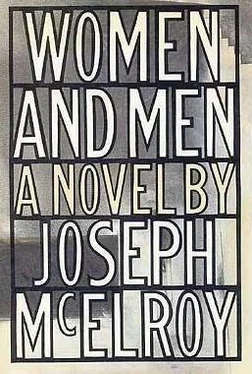Neither porcupine nor angel: yet with, between them, some relation that would be Us: so mightn’t we prove upon the twain drawing boards of everyone’s peripheral vision to be what rose from such thoughts as that not Matter became God, but God at’s own developmental pace became Matter, plus that the Whole seeking Parts to share, give way, and lose its mind-set force to, must force them Parts into being in its way.
We had first heard of relationship in the early forties. But of what century?
Or two burning eyes shared among four eyes of two driven people flowed with the greater burning stranded through Nature.
Regular coughing like that of Alexander’s one-night landmate so went through the body of his dreams that he, too, at his own slower intervals coughed his way at last out of a western mountain only to find, clear of the mountain, that the woman Sarah had left and that all this time the independent territory of the nightmare mountain with its luckily only internal contagion had been moving in another direction.
But we in our day have learned that we can accept other systems. Yea, incorporate them. We are about to forget but have not yet, that right in the middle of apparently major events we had been mispronouncing the hard T in Chinese Tao, which should mean "the way" but in practice embraces like the whole show/flo as if Nature, spied back through one of its own eyes, was stratified ocean or at least successfully liquefied. The Chinese invented T, so they should be allowed to sound it like our D if that is what they do, but if they then cannot accept the topological relationship with Dow the chemical concern, lest by western pun linguistic contaminant find its way into their Tao, they may in long run have to let the original source-compound go — i.e., DOw (Dual — Di — or two, Openings, or Obstacles, to each power of Waste), which reframes (for easy reference — in other emergencies other times when the older transformation equations got us through ethereal obstacles as if they existed or plotted our inequalities up L slopes and round R curves) to: either DOw (one unpredictably divided atom of waste — or was it water? — for each ho-muncule of reaction), or doW (where the lower d o designating the W’s "prior power" identifiable uncertainly as "di-obstacled" or as dioxide or — oxen or — xin, or the more and more widely used interhemispheric verb do) acts on a W which is Waste/We where if We will = Singularity Rotated to Unity or I, we’ll still get W but a new W shared between the Waste and the We in relationship not yet known, in part since relationship at the present time is reciprocal with whatever this We proves-out to be. For as with angel and porcupine, dream and its forgetting, relative viewing screens one in each of two next rooms reciprocally showing (if we would only get them together) no other responsibility than our own to end the agony (and at least half surprised that a leaf of music from one North American person should join by way of a soft pocket-in-motion the suddenly parted legs of a warm-hearted, calm, fine-looking South American person who has plunged toward a long sea whose choppy swells the moment fixes into rocks), so with Relation at large in the nutshell of Our sea-to-land base, it strives now inertially, now non-, to be a We we have been privately assured is us.
"We didn’t decide if your granddad actually went looking for her."
"I wouldn’t know; he never talked about it. I think he met with some union noise-makers in Philadelphia somewhere in there, maybe February of ‘94 (? I guess it would be) and fired off a couple of pieces to Margaret’s father at the Democrat —maybe a farmer’s group in eastern Pennsy, I’m not sure; he did mention a band of jobless vagrants at a riverbank campfire."
"In his sleep?"
"You’re in a funny mood."
"We haven’t decided if we’re staying there for the night or coming back for that silly opera."
"We could cover both."
"Let’s not divide the labor."
They stood toe to toe beside a turnpike phone-booth capsule, and, occupying unbudgeable a cleft that perhaps they themselves made and were, in the ambient oxides and simultaneously approaching and receding noise particles of happily stabilized vehicles-in-motion, the world that could not easily get lost for love (so close about them was it) still promised in their silly old bodies to be waiting for them when they got back. And he stepped aside from all this hotline lovingly between them whose telepathy he had known of long since with his wife but then only as they receded from each other — and had now a thought or two private to himself wondering if he could even reach his daughter (who might be on this same turnpike right now if she had turned again to some link between the death of that weirdly gifted Trace Window guy’s murder and the place where he had recently used that gift yielding however information that Flick-Sarah was unlikely to have obtained) — and then also accepting that he had not thought about his son by love or image-signal reconstitution in hours if not days.
But he would not stay within himself apart from imagining himself each of the elements of this scene according to her serious-hearted dream theory (that he would like to tell his old friend Ted if it would give him a remission from sickness) — so he came up with:
(1) himself as the turnpike cars en route to Windrow et al. running on automatic leaving fauna, flora, other machines to breathe what he gave off;
(2) himself as the glassed-in phone booth both target for relatively faster-moving eyes and slot relatively removed from a person who knew him and loved him and was not always charmed with his charm but would stand in his way like a guard fully exploiting the rules and with her lovely arms outstretched toward him;
(3) himself as her, as B.J., Jean: too strong to be split between resting here with him, marrying, living for this long moment, and winging off to an endless nutrition project in East Africa — as Jean? he felt her legs warm and conscious and knew that she was not telling him to go away along a warp of age differential as if he ever would die and come back either younger or in her body that he knew pretty well;
(4) himself as also his own (actually leased) car, accelerating like gravity from a city tunnel toward a past home (decelerating to then use the speed of sound to phone to check on a daughter’s safety and with marginal disloyalty to call an extended son, Larry, whose life and thinking had changed dramatically) — but this was not the mere car — it was him, it was Jim Mayn. . part of a multiple scene but not any one answer to it: until he rather casually and humorously spoke: "If I put myself into each of the components here, the cars, the pike, the phone booth, you, it comes out pretty dreamlike." She laughed with a tincture in her throat of contempt, and shook her head and said, "Make your call, and let’s get going. I was talking about actual dreams. You’re bullshitting me for some reason. I mean, you don’t believe this is a dream, this is a pretty odd day, I grant, when we have to go to a thing in New York tonight and you think you have to visit your father and the cemetery which is O.K. with me even if I don’t know what’s going on and you’re bullshitting me; but I know you’re more serious about the not-dreaming than even you are telling me." "If I don’t tell you, does that mean—" "Oh shit, man, ‘holding out on me’? Yes! When it’s this important."
She was bitching him as if he hadn’t been through twice her life. Larry had given over his systems hunt and relative reincarnation hypotheses, but they lived on. Say this Obstacle Geometry made a middle term by association with life on one hand and on another with how paths of astral bodies — light itself! — got deformed by massive bodies they neared: how did you — how did Larry, who said he wan’t talkin’ like this n’more — get from that middle-term stuff to being in more than one place-time at once? Mayn wheeled into the booth and told the operator to bill it to his Manhattan number, glad he had never installed one of those singles-people answering machines, but Flick/ Sarah was not at Lincoln’s or Amy’s or a club her mother’s fiance kept up his membership in, and Larry was out also, and Mayn seemed never to have stopped facing Barbara-Jean (Jean!) as close as a shower, close as some trip he left in a mind bag of unsorted non-news, though facing her to say he did not really think he had been through twice her life, not even twice his own — hers was her own—"I dreamt my own death, I think, once," she quickly said, glad they were friends again—"No," he said, "I know we get along." And he conveyed to her without more than a touch that he could explain something maybe in the car, which she then said she would drive — asking suddenly and lightly what the pistol was doing half-concealed in the lower sidepocket by the driver’s seat. Oh he had forgotten it the other night, in fact got into a discussion with a police detective and forgot even that the pistol could just as well be returned to the man from whom it had been easily taken except he’s dead now.
Читать дальше












